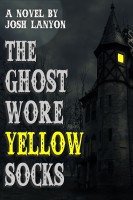The Brief History of the Dead - Brockmeier Kevin (первая книга txt) 📗
"Or how's this?" he amended his answer. "You were a stranger, but you were never complete." He laughed.
"Did I tell you I saw the blind man yesterday?"
It had the effect she wanted: his smile sank back into his face, and his eyes took on a look of simple curiosity. "No, you didn't. Where was he?"
"He was having an argument with a ticket vendor. I stopped and asked him if he was all right, and he said he was tired of remembering everything he wanted to forget and forgetting everything he wanted to remember. Those were his exact words: 'remembering everything he wanted to forget and forgetting everything he wanted to remember.' I think I might have been on the forgetting-everything-he-wanted-to-remember end of the spectrum. When I told him who I was, he said he was pleased to meet me."
"Yeah, he didn't remember me the last time, either. So that makes – what? – six for me and eight for you?" "Nine for me, thank you very much." "Nine it is."
The blind man had disappeared back into his solitude soon after they found their way to the monument district, and ever since then, they had seen him only in passing. They had made a bet that the first one to spot him ten times would win an unspecified favor from the other, collectible at any time. The blind man was something of a hermit, though, or at least he took a different set of streets than they usually did, and weeks would sometimes pass between one sighting and the next. Minny wasn't surprised that he didn't remember her. When she thought about those first few days with Luka, before they had heard the gunshots, it was tempting for her to imagine that the blind man had never been there at all. Luka had been the Adam to her Eve, the Friday to her Robinson Crusoe, the Master to her Margarita. None of them were stories that left room for anyone else.
On the other side of the restaurant, Minny saw Laura's parents, Mr. and Mrs. Byrd, eating a breakfast of what looked like scrambled eggs and toast. Mrs. Byrd was using her left hand, Mr. Byrd his right. Their other hands were concealed behind a salt and pepper caddy on the back side of the table, where they could lace their fingers together without anybody watching. They looked like two embarrassed teenagers on a first date. And, simultaneously, they looked like an old couple who had been holding hands so long that they no longer distinguished between the times when they were touching and the times when they weren't. It was sweet.
Minny had seen the two of them again and again since she had arrived in the city, had even waved to them every so often, but never once had they recognized her. This was understandable. After all, she had certainly changed a whole lot more in the years since she and Laura had been best friends than they had.
When she stopped to consider it, she realized that she probably hadn't thought about Laura more than fifteen or twenty times during the whole of her adult life. She had never been the kind of person who was haunted by memories of her past, or at least she hadn't been that kind of person before the virus and the news coverage and the sight of all those bodies propped up in the swaying green grass. But then she had died, and she had found out about Laura's fling with Luka, and all of a sudden she was thinking about her all the time. There wasn't much for her to remember, just a few stray images of the two of them playing house and pretending to walk a tightrope and then something about a butterfly and a fortress.
The man she was in love with and her best friend from – what? – third grade?
It was all too strange.
After they had finished eating and took care of the check, they gave up their table to a man in hiking boots and a business suit. It was snowing again, and Minny slipped her hands inside her pockets as they stepped out into the cold.
Luka hooked his arm around her waist and pulled her close to him as they crossed the street, his hand under the tail of her jacket. "Are you okay?" he asked.
"Mm-hmm."
"You seemed a little quiet back there for a while." "I know. I was just thinking." "About what?"
"About you. About Laura."
Luka put his fingertips on the hip of her dress, by which he meant to say, You shouldn't worry so much. Though what he actually said was "Man Loves Woman, Woman Loves Trouble."
"I don't love trouble," Minny sniffed.
" 'Man Loves Woman, Woman Loves Suffering,' then."
"I don't love suffering, either."
"Man Loves Woman, Woman Loves Coffee."
She bumped him with her shoulder, playfully. "I can't argue with that, I guess."
There were places where the snow had risen so far toward the roofs of the parked cars that they stretched down the side of the road in a series of identical, oddly shaped lumps, like the knots of someone's spine. The sidewalks were slippery with ice. Maybe it was just the banks of snow piled alongside every major lane of traffic, but sometimes it seemed to Minny that she was traveling through a city of tunnels, just another one of the mole people. The sensation was particularly strong on those gray, dismal days like today, when the sun failed to show itself behind the clouds.
She and Luka had established their own little circuit of stores, buildings, and restaurants soon after they decided to haul his newspaper equipment from his old office to his new one and move in together. It had been a long time since either one of them had ventured more than ten or fifteen blocks away from their apartment. But they had heard the same reports as everyone else. The snow had sealed the monument district off from the rest of the city. Luka had even written about it in a special double issue of the Sims Sheet. The district was framed by the river on one side and by a sliver of park and a pair of six-lane roads on the others. Beyond those borders the snowdrifts had become so high that the ground was almost impassable. All you could see were the corners of a half dozen billboards and the upper floors of a few tall buildings. It was as though the city were slowly digesting itself.
The man who always carried the signs with the religious messages printed on them passed by Minny and Luka with a placard that read, FOR OUT OF THE ABUNDANCE OF THE HEART, THE MOUTH SPEAKETH. He stopped and asked them if they had heard the sound.
He was talking about the heartbeat, Minny presumed. "I've heard the sound," she said.
"Yes," the man said, "we have all heard the sound, for it is the beating of His Sacred Heart."
"Is it?"
"He's coming soon. He'll be carrying my Bible for me." "I'm glad," Minny said.
The man flinched when she reached out to pat his arm, so she put her hand back in her pocket. "You stay warm now," she told him, and she and Luka slipped around him and across the intersection and finally through the door of their building.
Luka spent the rest of the afternoon working on the next day's edition of the newspaper while Minny read a novel by the light of the table lamp in the living room. The days, unlike the nights, passed quickly, and before she knew it she had finished the novel, and he had picked up dinner from the Korean restaurant down the street, and the two of them were standing at the kitchen counter eating noodles and kimchi out of waxed cardboard boxes. He was a journalist, with a journalist's dining habits. And because she had never developed any firm dining habits of her own – cleaning habits, yes; reading habits, definitely; dining habits, no – she had been happy to adopt his when they moved in together.
"Which do you like better: the idea of the past or the idea of the future?" she said a few minutes later, as he was packing the leftovers away in the refrigerator.
"Not this game again."
"The idea of the past or the idea of the future?" she insisted.
"You sound like an optometrist testing lenses. This one – or that one. This one – or that one."




